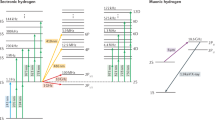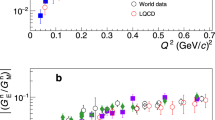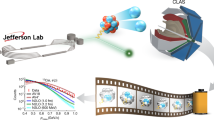Abstract
THEORETICAL considerations suggest that the square root of mass may be more interesting and important than mass itself in the case of the ultimate particles of matter. For in the modern theory of matter, electric charge is more fundamental than mass, and the dimensional formula for electric charge e is M1/2L3/2T-1 in the electrostatic system. Thus e is proportional to M1/2. This appears in more definite form if we adopt the classical point of view that the mass of the ultimate particles is entirely of electromagnetic origin. According to the theory of relativity, energy and mass are related by the well-known equation E = mc2. But if the energy E is entirely electromagnetic, E= ∫1/8π(F2 + H2)dv, where Fand H are the electric and magnetic field intensities respectively. Thus m depends on the square of F and H, corresponding to the fact that it depends on the square of e. Carrying out this process yields the well-known formula
This is a preview of subscription content, access via your institution
Access options
Subscribe to this journal
Receive 51 print issues and online access
$199.00 per year
only $3.90 per issue
Buy this article
- Purchase on Springer Link
- Instant access to full article PDF
Prices may be subject to local taxes which are calculated during checkout
Similar content being viewed by others
Author information
Authors and Affiliations
Rights and permissions
About this article
Cite this article
WITMER, E. The Relative Masses of the Proton, Electron, and Helium Nucleus. Nature 124, 180–181 (1929). https://doi.org/10.1038/124180a0
Issue Date:
DOI: https://doi.org/10.1038/124180a0
This article is cited by
-
Die Sommerfeldsche Feinstrukturkonstante und das Problem der spektroskopischen Einheiten
Die Naturwissenschaften (1950)
-
Proton and Electron
Nature (1931)
Comments
By submitting a comment you agree to abide by our Terms and Community Guidelines. If you find something abusive or that does not comply with our terms or guidelines please flag it as inappropriate.



